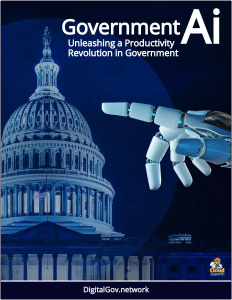How Generative AI is Reshaping Local Government Services
Pioneers like Swindon Borough Council demonstrate how powerful AI technologies like Amazon Bedrock can transform local government inclusivity from an aspiration into a practical reality.
 Generative AI offers powerful opportunities to enhance inclusivity by making information more accessible, simplifying complex content, and tailoring communication to diverse needs.
Generative AI offers powerful opportunities to enhance inclusivity by making information more accessible, simplifying complex content, and tailoring communication to diverse needs.
In the featured video Rob Emerson, Manager of Digital Transformation & User Experience for the City of Barrie, Canada, discusses their approach to Generative AI as a long-term transformation rather than a short-lived trend.
By adopting AI and reshaping public services, the city aims to leverage AI’s potential to meet citizen expectations. The discussion covers the management of data privacy issues, employee empowerment, and the scalable opportunities that AI offers to smaller organizations.
It also explores how AI is evolving from providing information to connecting residents with services, highlighting the importance of patience and proactivity in navigating the changing technological landscape.
Improve Inclusivity in Local Government
Another compelling example of this is the Swindon Borough Council’s use of Amazon Bedrock, a fully managed generative AI service from AWS, to develop a solution called “Simply Readable.” As they announced here, Anthropic provides the ‘Claude’ AI to power these innovations.
Swindon Borough Council’s use of Amazon Bedrock illustrates how generative AI can transform inclusivity from an aspiration into a practical reality, offering a blueprint for others to follow in creating a more equitable world.
Swindon Borough Council, a local authority in England, recognized the need to better serve its constituents, particularly the estimated 1.5 million people in the UK with learning disabilities—a group that globally represents about 15% of the population. Public-service providers like Swindon are tasked with delivering accessible information to empower citizens to make informed decisions.
This initiative demonstrates how generative AI can break down barriers for individuals with learning disabilities, low literacy skills, or other cognitive challenges, fostering greater independence and equity in accessing public information.
Sarah Peña, Head of Emerging Technology, Business Improvement & Web at Swindon Borough Council, shares her experiences of the AI projects she’s been spearheading within the council and their impact on the community.
Simply Readable
Traditional methods of adapting content, such as manually creating “Easy Read” versions of documents (simplified text with larger fonts, wider spacing, and supportive images), were time-consuming and resource-intensive. To address this, Swindon turned to generative AI, leveraging Amazon Bedrock to streamline the process and amplify its impact.
Using Amazon Bedrock, Swindon developed “Simply Readable,” a tool that converts complex documents—like a 50-page tenancy agreement—into Easy Read formats quickly and efficiently. Amazon Bedrock provided access to high-performing foundation models, such as Anthropic’s Claude for text generation and Stability AI’s Stable Diffusion for image creation, through a single API. This allowed the council’s development team to experiment rapidly, adapting content within days rather than weeks.
The tool simplifies text, increases font size, widens spacing, and generates relevant images to aid comprehension—features informed by direct feedback from a volunteer group called “Experts by Experience of a Learning Disability.” This group, composed of individuals with a range of learning disabilities, emphasized the importance of avoiding jargon, using clear visuals, and ensuring readability, shaping the solution to meet real user needs.
The inclusivity benefits of this approach are significant. “Simply Readable” not only supports those with learning disabilities but also has the potential to assist individuals with low literacy, cognitive impairments, or those who prefer information in another language (the tool supports conversion into 75 languages).
By automating the creation of accessible content, Swindon reduces the time and cost of traditional methods, making it feasible to scale this service across more documents and services. The council retains human oversight, with staff reviewing and refining AI-generated outputs to ensure accuracy and appropriateness, balancing innovation with responsibility.
Beyond its local impact, Swindon Borough Council plans to open-source “Simply Readable,” sharing the tool and its curated prompts license-free with other councils, public services, and nonprofits worldwide. This amplifies its potential to improve inclusivity on a global scale, particularly in sectors like social care and health. The solution’s integration with AWS’s secure, serverless infrastructure ensures data privacy and scalability, key considerations for public-sector adoption.
Community Co-Design
Swindon’s case highlights broader principles for using generative AI to enhance inclusivity. First, it underscores the value of co-design—working directly with affected communities to identify needs and refine solutions.
Second, it shows how AI can automate labor-intensive tasks without sacrificing quality, freeing resources to reach more people. Third, the use of multimodal capabilities (text and images) caters to diverse learning preferences, making information more universally accessible. Finally, the emphasis on security and responsible AI, enabled by Amazon Bedrock’s features like Guardrails, ensures that inclusivity efforts respect user privacy and ethical standards.
For organizations looking to replicate this approach, Swindon’s experience suggests starting with a clear inclusivity goal—such as improving access to information—then leveraging generative AI tools like Amazon Bedrock to experiment with foundation models tailored to that purpose. Engaging end-users early, as Swindon did with its focus group, ensures the solution aligns with real-world needs.
Additionally, integrating AI with existing systems (Swindon used AWS’s broader ecosystem) can enhance efficiency and scalability, while a commitment to sharing outcomes can extend the benefits beyond a single entity.




